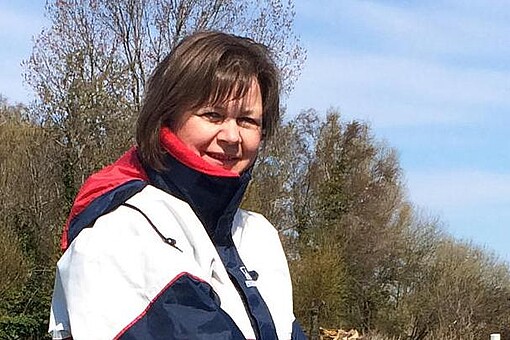Vorlesungen/Seminare
- Seminar Umweltbewertung
- Umweltchemie und Toxikologie
- Grundlagen der Chemie
Praktikumsleitung:
- Anorganisch Chemisches Praktikum
- Umweltanalytikpraktikum

Department Umwelttechnik
Professorin für Umweltchemie und Toxikologie
Ulmenliet 20
21033 Hamburg
Raum S2.39
T +49 40 428 75-6417
Vorlesungen/Seminare
Praktikumsleitung:
Forschungsprojekte/-gebiete
(1) Projekttitel: North Sea - Observationand Assessment of Habitats” (NOAH)
Teilprojekt 8: Erfassung und Bewertung von Schadstoffbudgets und -prozessen in der Deutschen Bucht -integrierende Werkzeuge zur räumlich strukturierten, nachhaltigen Meeresnutzung
Förderorganisation: Bundesministerium für Bildung und Forschung (BMBF)
Förderzeitraum: 3 Jahre (2013-2016)
www.noah-project.de
(2) Projekttitel: Bestimmung der Bioverfügbarkeit und ökotoxikologischen Wirkung persistenter organischer Schadstoffe in Sediment-Porenwassersystemen mittels eines neu zu entwickelnden in-situ Probenahmesystems zur Messung der frei gelösten Porenwasserkonzentrationauf Basis der Festphasenmikroextraktion
Förderorganisation: Deutsche Forschungsgemeinschaft (DFG)
Förderzeitraum: 3 Jahre (2009-2012)
(3) Projekttitel: Ökotoxizität von Polycyclischen Aromatischen Kohlenwasserstoffen in Sedimenten und fluffy layer Material der Ostsee (ÖKOTOX)
Förderorganisation: Deutsche Forschungsgemeinschaft (DFG)
Förderzeitraum: 3 Jahre (2002-2005)
(4) Projekttitel: Untersuchung der Mobilität ausgewählter polycyclischer aromatischer Kohlenwasserstoffe (PAK) pyrogenen und petrogenen Ursprungs im Sediment/Porenwasser von Oberflächensedimenten (MOBIL)
Förderorganisation: Deutsche Forschungsgemeinschaft (DFG)
Förderzeitraum: 3 Jahre (2002-2005)
(5) Projekttitel: Ökotoxikologische Untersuchungen in drei Gebieten der deutschen Ostseeküste
Förderorganisation: Bundesanstalt für Gewässerkunde (BfG)
Förderzeitraum: 3 Jahre (2002-2005)
(6) Projekttitel: Eintrag und Transport polycyclischer Aromatischer Kohlenwasserstoffe in die Oder und deren Ästuar (ODER)
Förderorganisation: Deutsche Forschungsgemeinschaft (DFG)
Förderzeitraum: 3 Jahre (1997-2001)
Ämter
Deutsche Forschungsgemeinschaft
Stellvertretende Sprecherin Fachkollegium Wasserforschung (2020-2023)
DFG link
Professionelle Mitgliedschaften
Doktorarbeiten
Nora Niehus
Thema: North Sea - Observation and Assessment of Habitats (NOAH): Entwicklung und Adaption eines Gleichgewichtssammlers und dessen Kopplung mit Biotestsystemen als Indikatoren zur Bewertung der Bioverfügbarkeit und ökotoxikologischen Wirkung hydrophober organischer Schadstoffe in Sediment-Porenwassersystemen der Deutschen Bucht
Kooperationsuni: RWTH Aachen, Prof. Henner Hollert
2014- 2018
Mathias Reininghaus
Thema: Risikoabschätzung von hydrophoben organischen Schadstoffen auf Basis der biologisch verfügbaren Schadstofffraktion in Sediment-Porenwassersystemen der Küstengewässer von Nord- und Ostsee
Voraussichtliche Dauer: 4/2016-4/2022
Kooperationsuni: RWTH Aachen, Prof. Henner Hollert
Anne Kreutzer
Thema: Passive sampling and passive dosing to study effects of hydrophobic organic carbons in sediment cores of marine sediments
Voraussichtliche Dauer: 01/2018-12/2022
Kooperationsuni: RWTH Aachen, Prof. Henner Hollert
Silja Denise Kröger
Thema: Developing and Implementing Sustainability-Based Solutions for Bio-Based Plastic Production and Use to Preserve Land and Sea Environmental Quality in Europe - Potential Impacts of Bioplastic on the Terrestrial and Aquatic Environments Voraussichtliche Dauer: Juni 2019-Oktober 2022
Voraussichtliche Dauer: 01/2020-12/2022
Kooperationsuni: RWTH Aachen, Prof. Henner Hollert
Moritz Kielmann
Thema: Mikroplastik als Schadstoffsammler-Ein innovativer Ansatz zur kom-binierten chemischen und biologischen Analyse von hydrophoben organischen Schadstoffen in Mikroplastik aus Sedimenten
Voraussichtliche Dauer: 01/ 2021-12/ 2023
Gesine Witt
Google Scholar Publikationsliste
Ausgewählte Publikationen
N.Bartolomé, I. Hilber, R. Schulin,P. Mayer,G.Witt, MathiasReininghaus, T.D.Bucheli. Comparison of freely dissolved concentrations of PAHs in contaminated pot soils under saturated and unsaturated water conditions, Science of The Total Environment 644, 835-843. doi.org/10.1016/j.scitotenv.2018.06.359
N. C. Niehus, B. Brockmeyer, G. Witt (2019). Bioavailability and distribution of PAHs and PCBs in the sediment pore water of the German Bight and Wadden Sea. Marine Pollution Bulletin 138:421-427. doi: 10.1016/j.marpolbul.2018.11.052
N. C. Niehus, S. Schäfer, C. Möhlenkamp, G. Witt (2018). Equilibrium sampling of HOCs in sediments and suspended particulate matter of the Elbe River. Environ Sci Eur (2018) 30: 28. DOI: doi.org/10.1186/s12302-018-0159-8DOI:10.1186/s12302-018-0159-8
Witt G., Bachtin J., Schäfer S. (2019): Equilibrium sampling of hydrophobic organic contaminants in sediments. In: Seiler T-B, Brinkmann M (Editors), In Situ Bioavailability and Toxicity of Organic Chemicals in Aquatic Systems. Methods in Pharmacology and Toxicology. Springer Science+Business Media, New York, pp. DOI 10.1007/7653_2019_39
Mathias Reininghaus, Thomas F. Parkerton, Gesine Witt, Comparison of In Situ and Ex Situ Equilibrium Passive Sampling for Measuring Freely Dissolved Concentrations of Parent and Alkylated Polycyclic Aromatic Hydrocarbons in Sediments (2020). Environmental Toxicology and Chemistry 39, Issue11, 2169-2179. doi.org/10.1002/etc.4849
Mayer, P. Parkerton, T.F., Adams, R.G. Cargill, J.G., Gan, J., Gouin, T., Gschwend,P.M., Hawthorne, S.B., Helm, P., Witt, G., You, J., Escher B.I. (2014). Passive sampling methods for contaminated sediments: Scientificrationale supporting use of freely dissolved concentrations. IntegratedEnvironmental Assessment and Management 10, 197–209.
Witt, G., Lang, S.-C., Ullmann, D., Schaffrath, G., Schulz-Bull, D., Mayer. P. (2013). A passive sampler for in situ measurements of freelydissolved concentrations of hydrophobic organic chemicals in sediments. Environ. Sci. Technol. 47, 7830-7839.
Liehr, G.A., , Heise, S., Neddermann, K., Ahlf, W., Witt, G. (2013). Assessing the risk of a 50-year-old dump site in the Baltic Sea bycombining chemical analysis, bioaccumulation, and ecotoxicity. Journal of Soils andSediments: Volume 13, 1270-1283.
Schneider, A. J., Seiler, T. B., Schmidt, K., Witt, G., Schmidt, B., Schäffer, A.,Hollert, H. (2010). Bioverfügbarkeit, chronische Toxizität und Bioakkumulationvon polyaromatischen Heterozyklen im Sediment-Porenwasser-System.Umwelt-wissenschaften und Schadstoff-Forschung, Volume 22, Number 4, 396.
Schmidt, K., Schulz-Bull, D., Witt, G. (2010). On the way to bringing equilibrium SPME off-shore: Development of an in-situ sampling device for persistent organic pollutants in sediment porewater. Umweltwissenschaften und Schadstoff-Forschung, Volume 22, Number 4, 314.
Witt, G., Liehr, G. A., Borck, D., Mayer, P. (2009). Matrix solid-phase microextraction for measuring freely dissolvedconcentrations and chemical activities of PAHs in sediment cores from the western Baltic Sea. Chemosphere, 74, 522–529.
Witt, G., Bartsch, C., Liehr, G.A., Thiele, R., McLachlan, M.S. (2009). Using solid-phase microextraction to evaluate the role of different carbon matrices in the distribution of PAHs in sediment-porewater systems of the Baltic Sea. J. Soils Sediments 10, 1388–1400.
Wölz, J. , Borck, D., Witt, G., Hollert, H.(2009). Ecotoxicological characterization of sedimentcores from the western Baltic Sea (Mecklenburg Bight) using GC-MS and in vitrobiotests. J. Soils Sediments 9, 400–41.
Christiansen, C., Leipe, T., Witt, G.,Christoffersen P. L., Lund-Hansen L. C. (2009). Selected elements, PCBs, and PAHs in sediments of the North Sea – Baltic Sea transition zone: Sources and transport as derived from the distribution pattern. Geografisk Tidsskrift-Danish Journal of Geography109, 81-94.
Auszeichnungen und Stipendien